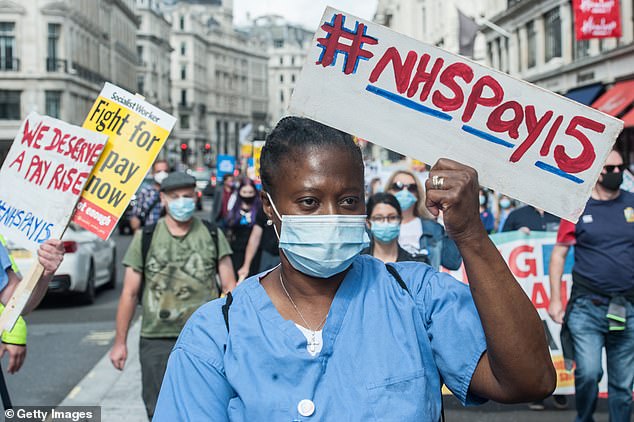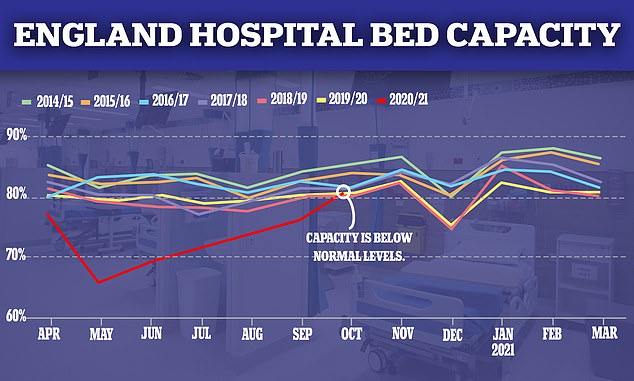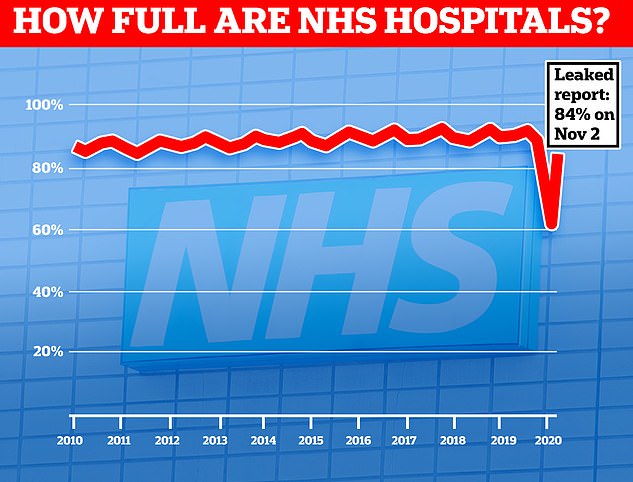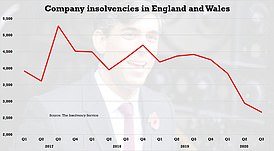‘Opportunistic’ unions demand pre-Christmas pay-rise for all ‘burned out’ NHS staff – even the ones not dealing with covid
- Fourteen unions are calling for a pay rise for all 1.3 million NHS staff next month
- But nonessential NHS services branded ‘cynical’ for piggybacking on pandemic
- Some dietitians, opticians and podiatrists been twiddling thumbs for months
Dietitians, opticians and other non-essential NHS staff were today branded ‘cynical’ for asking for a pre-Christmas pay rise during the coronavirus pandemic.
Boris Johnson has promised a salary bump to doctors, nurses and other workers who have been fighting coronavirus on the front lines by next April.
There has been widespread public support for the move in part because more than 600 of them lost their lives battling the disease during the first wave.
However, 14 health unions have written to the Prime Minister calling for a pay rise for 1.3million NHS staff next month, warning that thousands of medics could leave unless the ‘right decision’ is made. The unions demanding action include the British Dietetic Association, British Orthoptic Society, Chartered Society of Physiotherapy and College of Podiatry.
The Institute of Economic Affairs think-tank today slammed these groups for being opportunistic and trying to piggyback on the public support for frontline workers, who’ve bore the brunt of the UK’s crisis.
Almost all NHS services were cancelled during the first lockdown in spring to protect the health service and most are still operating at extremely limited capacity due to heightened infection control and social distancing guidelines. It means some non-essential NHS workers have been left twiddling their thumbs for the better part of the year.
It’s true that many nonessential staff were redeployed to help first the first wave as wards became overrun with Covid-19 patients. But hospitals were only busy for a couple of months and remained much emptier than normal for the majority of the year.
And the economic fallout from the Covid-19 pandemic has fallen almost entirely on the shoulders of the private sector, with almost 10million Brits furloughed, many of whom will eventually be made redundant.
Christopher Snowdon, head of lifestyle economics at the IEA, told MailOnline not only was it ‘cynical’ that non-frontline staff were trying to demand a pay rise, it was also ‘economically impossible’ in the current climate.
Mr Snowdon added that although at certain points ‘this has been the busiest time ever for the NHS’, for large parts of the year it has also ‘been the quietest, even for nurses’.

NHS nurses marched through central London in September demanding a 15 per cent pay rise
The fourteen unions have warned NHS staff could quit in droves if the PM doesn’t bump up their salaries heading into the deep winter months, when Covid-19 hospital cases are expected to soar.
In their letter today, they wrote: ‘They feel stressed, burned out and fearful. It is increasingly unrealistic to ask them to carry on regardless.
‘The pandemic has affected staff profoundly and many may not stay around when the job is done.


‘Raising pay this year could persuade them to change their minds and prove attractive to thousands of much-needed potential NHS recruits.
‘Times may be tough but you know morally this is the right decision to take.’
There is no doubt NHS staff fighting Covid-19 have gone above and beyond their duty, hundreds of which paid the ultimate price with their lives.
Their efforts were recognised by the entire country which committed to a ‘weekly’ clap for frontline staff to show their gratitude.
But when it comes to giving them a pay rise, there are concerns about where the Government will be able to cobble together the cash.
Mr Snowdon told MailOnline: ‘I think emotionally people can see doctors and nurses at times this year in various parts of country have been extremely busy and extremely stressed – whereas presumably opticians and dietitians haven’t been.
‘The case for giving non-frontline medics a pay rise is even weaker than it is for other medics [doctors, nurses etc].
‘I would say it’s a little bit cynical from them [opticians, dietitians and other nonessential health workers] to use it as an opportunity to lobby for a pay rise.’
He added: ‘Unfortunately, the economic reality is we can’t afford to give anyone a pay rise – the economy is going to be down 10 per cent by this year.
‘We’ve gone back 15 years or so in terms of economic resources, and if the economy shrinks by 10 per cent then [theoretically] you need to shrink public wages by 10 per cent.
‘The country as a whole has made enormous sacrifices this year – millions have lost their jobs and an even greater number have taken pay-cuts.
‘Not only have people outside the NHS made sacrifices financially, they have also made sacrifices with their healthcare – by staying home and protecting the NHS.
‘There’s going to be no redundancies in healthcare. So is it fair to have no redundancies in the public sector and rising wages, while the rest of the country loses their job and takes pay cuts?
‘It not only strikes me as unfair but it is economically impossible.’
On health unions threatening workers could quit in droves if their pay demands are not met, Mr Snowdon said: ‘If you’re going to push economy back 10 years, I don’t know how realistic it is that people are going to quit – or where they think they’re going to go.
The 14 unions are the British Association of Occupational Therapists, British Dietetic Association, British Orthoptic Society, Chartered Society of Physiotherapy, College of Podiatry, Federation of Clinical Scientists, GMB, Managers in Partnership, Prison Officers Association, Royal College of Midwives, Royal College of Nursing, Society of Radiographers, UNISON and Unite.
UNISON’ head of health Sara Gorton told the Daily Mirror: ‘The NHS can’t run without its staff. They all deserve better from porters to nurses.
‘Their dedication during the pandemic has been humbling. But no one is superhuman and many are feeling the strain.
‘Boris Johnson must show he has a heart with a pay rise before Christmas.
‘It will boost exhausted staff going into the second wave and help the NHS attract much-needed new recruits.’
Hannah Reed, national officer at the Royal College of Nursing, said: ‘NHS staff have been underpaid for years and there has never been a more critical time for the Government to address this.
‘Paying staff fairly will show that they are valued and begin to turn the corner on the record nursing and wider vacancy levels.
‘The NHS is facing an extremely challenging few months due to the combination of Covid-19 and winter pressures. Without urgent action on pay, vacancies across the NHS will continue to increase.’
A spokeswoman for the Department of Health and Social Care said: ‘We are grateful for the hard work and dedication of our frontline staff, particularly during the pandemic.
‘NHS staff benefit from the final year of a three-year pay deal, agreed with trade unions, which has delivered year-on-year pay increases. The independent NHS Pay Review Body makes recommendations to Government on pay increases for NHS staff and we will consider their advice when we receive it.’
It comes after nurses marched through Trafalgar Square in London demanding better wages in September.
Campaigners – many of which protested with fake blood splattered across their NHS scrubs – marched after a two-minute silence in honour of the 640 healthcare workers who died during the pandemic.
The protest comes after nurses were excluded from the wage increase for around 900,000 public sector workers announced in July.
Chancellor Rishi Sunak unveiled salary increases which included doctors and dentists seeing their pay rise by 2.8 per cent – more than three times the rate of inflation – in recognition of their ‘efforts on the frontline’.
The largest increase of 3.1 per cent was being reserved for teachers despite the fact they have not been teaching full class sizes for months.
But nurses saw no extra rise at the time because they were in the last year of a three-year pay deal which saw many in the profession receive a pay hike of 4.4 per cent.

